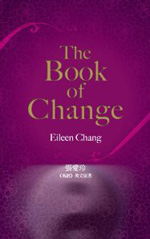

University of Washington Press, paperback, 9789888028207
Eileen Chang's reputation as an author has come full circle. Her writings were beloved in occupied Shanghai during World War II, but she lost her popularity as the Cultural Revolution marginalized writers, like Chang, who created stories without a political subtext. Today she is generally considered to be one of the great Chinese writers of the twentieth century.
The Book of Change and its prequel The Fall of the Pagoda are semi-biographical works of fiction that the author chose to write in English.
The story in this book picks up where The Fall of the Pagoda ended, with teenage Lute fleeing her father's house and moving in with her mother, from whom she is estranged. When her mother's plans for Lute to study in Europe are thwarted by the approach of war, Lute enrolls instead at a university in Hong Kong. It is here in Hong Kong where most of the novel takes place. The Japanese invade the city shortly after her arrival, and Lute is stranded and must fend for herself. An Indian student who journeys with Lute from Shanghai to Hong Kong becomes her close companion, and the two of them navigate many of the shocks and deprivations of war together.
While Chang provides a decent first-hand account of war, even more compelling is her portrait of a strained mother-daughter relationship. Women around the world will recognize the mixture of love, admiration, disdain and mistrust that occurs between Lute and her mother, Dew. The tension in their relationship dominates the first half of the novel, and Chang portrays it beautifully. Dew had been born at the cusp of the great social changes in twentieth century China, straddling both the traditional and modern ways. She had been required to marry out of duty, and she had endured bound feet. Despite her upbringing, she managed to flee the marriage and live somewhat independently, and it was paramount to her that Lute receive a college education.
Dew had been appropriately obedient to her mother as had generations before her, and she expected the same from Lute. She was deeply hurt that while Lute understood what Dew had endured, she was not obedient.
While the chain may have broken, their relationship was neither simple nor static. Lute's growing appreciation for her mother's accomplishments and character as the novel progressed was one of the signs of her developing maturity into adulthood.
The inferior status of women in China during this time period is also described eloquently. In one instance, Lute is observing, with pity, a woman so devoted to her husband that she is incapable of loving anyone or anything else:
While Lute is still constrained by some of these traditions, the war has started to sweep away others. By the
novel's end, Lute is content, amidst all of her war losses, to have gained the inner strength and confidence to face
this new world. In an act of sheer daring, she secures passage for herself and her friends on a highly sought-after
boat to Shanghai, risking her life in the process. In doing so, Lute rediscovers what matters to her, and she enters
Shanghai ready to face the challenges ahead.
